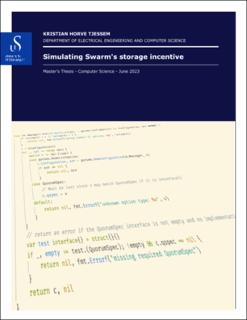| dc.description.abstract | Swarm is a decentralized storage platform consisting of several independently operated nodes.
The nodes store data units called chunks.
Storing chunks allows them to partake in Swarm's storage incentive.
The storage incentive is a monetary incentive for people to operate nodes.
This thesis investigates how the incentive is distributed based on simulation results.
Analyzing the equality of the distribution and comparing the outcome of node operators with a single node and those with multiple.
A simulator of the storage incentives was designed and created.
Then, simulating several configurations for 100s of thousands of rounds for the reward distribution to get an insight into how it's distributed among nodes.
Then some Swarm nodes were run in a virtual machine to test the resource usage and viability of running multiple nodes.
In a network where node operators can only have one node each,
the simulation shows that a network with ideal conditions has an almost equal outcome.
The outcome is significantly less equal if the network allows nodes to partake in more than one neighborhood.
The reward distribution in the storage depth implementation is found to be influenced by the number of nodes and storage depth.
Increasing storage depth without a proportional increase in nodes leads to fragmented neighborhoods with varying levels of participation.
When one operator can run multiple nodes, my finding is that too many nodes have a diminishing return.
This happens because the nodes of the operator start to compete among themselves instead of competing against others.
Since the simulator was made modular, it was, for example, easy to change stake distribution while having the same network and vice versa.
This allowed for quickly testing different configurations.
The results are saved to an SQLite database that allows data analysis without rerunning the simulator. | |
